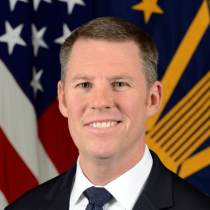
April 28, 2021
As published by the Middle East Institute
Mick Mulroy

Middle East defense and security policy in the first 100 days
As highlighted in the “Interim National Security Strategic Guidance” released at the beginning of March, the first 100 days of the Biden administration saw a shift from the unilateralism of the previous administration’s toward greater international cooperation and multilateralism in some areas and less direct American military engagement in others.
In the Middle East and Central Asia, this can be seen in the new attention given to an international effort to end the conflict in Yemen and the desire to engage with Iran and potentially reenter the Joint Comprehensive Plan of Action (JCPOA), but also in the decision to withdraw all forces from Afghanistan over the objection of senior military leadership.
Yemen
The withdrawal of U.S. military support to the Saudi-led coalition’s efforts in Yemen did not come as a surprise. That support was minimal, and the withdrawal may have little impact on the conflict. If it does reinforce the position that there is no military solution to the civil war, that is a good thing, but it does not absolve the U.S. of responsibility to be part of the effort to end the war.
We must follow that decision by taking an international leadership role to gain and maintain a cease-fire and develop a plan to take Yemen from a failed to a fragile and eventually a functioning state. Appointing Tim Lenderking as the U.S. special envoy for Yemen was a good step in that direction paired with U.N. Special Envoy Martin Griffiths.
Iran
The new administration was correct in responding to attacks by Iranian-backed militia against our forces in Iraq and carrying out those responses with airstrikes in Syria. This action demonstrated to Iran that there would be consequences to their use of proxy forces against us and avoided the consequences of escalating the situation in Iraq by responding in Syria.
The JCPOA was not a perfect agreement, but since our decision to withdraw, Iran has surpassed the limits on enrichment and storage, despite the sanctions. Current negotiations on the JCPOA should seek to get back to an agreement that stops Iranian ambition to gain nuclear weapons and stops the malign activity that the Islamic Revolutionary Guard Corp (IRGC) and the Ministry of Intelligence and Security (MOIS) conduct throughout the region.
Afghanistan
Although it is understandable to want all of our forces to return from Afghanistan after almost 20 years of fighting, we should not do that at the potential expense of everything we have gained. We should keep between 3,500 and 4,500 of our forces there to maintain our counter-terrorism efforts and enable our partners in their fight against the Taliban, the same group that provided al-Qaeda a safe haven before Sept. 11, 2001.
We should also ensure that those who fought alongside us are not forgotten. If the Taliban continues to take territory, they will likely seek retribution against those that stood against them and next to us. There should be special consideration given to those individuals should they seek asylum in our country.
Mick Mulroy is a senior fellow and co-director of the Yemen Steering Initiative at the Middle East Institute, former deputy assistant secretary of defense for the Middle East, retired CIA paramilitary officer, and co-founder of the Lobo Institute.


